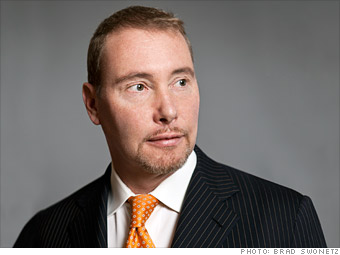Search News

Ticker: DBLFX
Assets: $1 billion
U.S. intermediate-term bond average: 5.5%
Year-to-date return: 10.6%
What he likes now: Mortgage-backed debt
Gundlach has been buying steeply discounted mortgage securities, yielding 10% to 11%, that aren't guaranteed by U.S. agencies like Freddie Mac.
There's no doubt that Jeffrey Gundlach was a big winner in the market this year. Yet his most satisfying victory of 2011 might have come in a Los Angeles courtroom in September, when he won a $67 million judgment from his former firm, TCW, after a bitter battle over his exit in 2009. Gundlach, 52, has long been a bond market star. At TCW he outperformed 99% of his peers in the decade before his departure. And he's stayed right on track since founding his new firm, DoubleLine Capital, where assets skyrocketed this year to $20 billion from $7 billion in 2010.
The flamboyant Gundlach combines a sharp intellect (he was a Ph.D. candidate in mathematics at Yale) with a braggadocio rare in the reserved world of bond funds. He starts work at home at 6 a.m., then drives to his downtown L.A. office listening to talk radio. "One of the most productive things I do, and it sounds crazy, is listen to the radio," he says, because he learns how people are spinning news that moves markets. Gundlach spends most of his time on DoubleLine's trading floor and handles 50% of the firm's trades himself.
His biggest bet this year was that U.S. Treasury prices would rise -- a profitable move missed by the majority of bond managers, who expected a rise in interest rates by year's end. He made other savvy moves too. He slashed the fund's allocation to junk bonds after they rallied in the first quarter; they later crashed. And he has avoided owning even a cent of euro-denominated debt and says he doesn't plan to buy any.
Recently Gundlach has been loading up on unpopular mortgage-backed securities not guaranteed by the U.S. government. He says they're so cheap that he'll make money even if real estate stays depressed. That's good, because he believes debt problems will continue to plague the U.S. economy for some time. "It's very likely the next recession comes due to an attempt to balance the budget," he warns.
